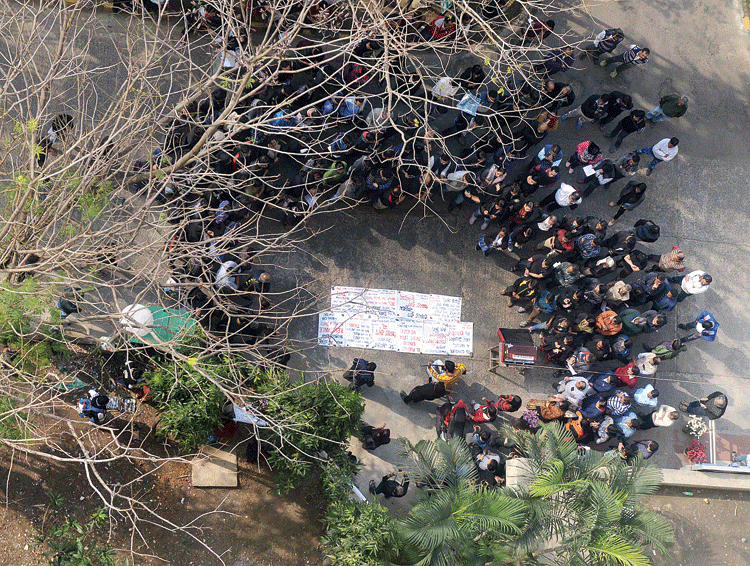Students and teachers of Indian Statistical Institute formed a human chain and sang Jana Gana Mana on Wednesday afternoon to protest Sunday’s attack on students and teachers of Jawaharlal Nehru University.
If one Tagore poem marked the final act, another was a high point of what the protesters called a “cultural assembly”. A professor of computer science recited Africa, calling the poem “very relevant because it speaks about discrimination”.
The group also sang Hum Dekhenge, a poem by the late Pakistani poet Faiz Ahmad Faiz which has been in the centre of a storm since December 17, when a group of students of IIT Kanpur sang it while protesting the Citizenship (Amendment) Act and faced the wrath of the administration.
On Wednesday, in between singing, a young researcher on the Baranagar campus took time to interpret the lines from Hum Dekhenge: “When from this God’s earth, the icons of falsehood will be removed; when we — the real faithful who have been condemned by zealots claiming to be the keepers of faith — will be invited to sit at the royal altar….”
The organisers said the rough translation would serve to dispel the “Right-wing narrative” that the poem was anti-Hindu or communal. “The poem is a symbol of protest against oppression in any form,” said an organiser, doing her PhD in genetics.
Wednesday was the second time in less than a month that ISI — one of India’s premier institutes with a global reputation and one not known for political activities — raised its voice in protest.
On December 23, hundreds of students and teachers from the campus had marched through the neighbourhood to condemn the police crackdown on students of Jamia Millia Islamia and other institutes over protests against the CAA and NRC.
As the horror at JNU unfolded, messages flooded the WhatsApp and Facebook groups of ISI students. “There was complete unanimity that we should not sit idle,” said an organiser, who is doing her master’s in quantitative economics.
A research scholar, who did her master’s in economics from JNU, was among the protesters. “I have never felt so helpless as I was feeling on Sunday evening, watching the videos,” she told Metro.
The hour-long “cultural assembly”, held during the lunch break, was marked by absence of high-pitched slogans but songs and a one-act play, rounded off with a full rendition of Jana Gana Mana, more than made up for it.
The 25-minute play — enacted by one person in various roles — was based on Madhusudan Dada, an old Bengali fable retold from the perspective of a migrant worker.
“Ekdin jara merechhilo tare giye, rajar dohai diye, e jugey tarai janmo niyechhe aaji, mandire tara esechhe bhakto saji; ghatak soinye daaki, maro maro othe hnaaki…,” recited a teacher, borrowing Tagore’s lines.
A rough translation: “Those who assassinated him once in the name of the king, have reborn in the present; disguised as devotees in temples are butchers baying for blood.”
“The poem was written to portray the crucifixion of Christ at the behest of Romans. The same Romans took to Christianity and spilled a lot of blood to spread the religion. We hope India does not take a similar direction,” the teacher told Metro later.
A professor of computer science recited Africa, Tagore’s poem on imperialist subjugation. “Elo ora lohar hathkodi niye, nokh jader teekhno tomar nekrer cheye (They came with shackles forged from cruel iron/Those who bear claws sharper than the wolves that roam the land)....”
“The poem is essentially about discrimination, something that surrounds us now. Blood of students is spilling on the campus. Questions are being raised on the authenticity of the blood,” the teacher said.











